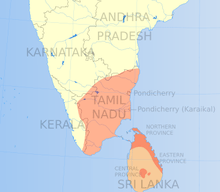Tamil South Africans
| Total population | |
|---|---|
| 600,000 | |
| Regions with significant populations | |
| KwaZulu-Natal | |
| Languages | |
| English, Tamil, Languages of South Africa | |
| Religion | |
| Hinduism |
| Part of a series on |
| Tamils |
|---|
 |
Tamil South Africans are South Africans of Tamil descent. Tamil people form the majority of Indian immigrants who came from India to Natal, South Africa, from 1860 onwards.[1] After the expiry of their indentures most of these Indians moved to the cities, becoming established as a thoroughly urban population.[2][3]
Arrival in South Africa
In 1833, the British Parliament passed the Act of Abolition, which banned slavery throughout the British Empire. The consequence of this was that many African slaves in the Colony of Natal decided to desert their former masters. The former masters, lacking sufficient labour force, persuaded the skeptical British authorities in India to implement the system of indentured labour in Natal. On November 16, 1860, 342 men, women and children arrived aboard the S.S. Truro in Port Natal (Durban).
Apartheid
Apartheid alienated all Indians as disenfranchised non-whites, and Hinduism in particular was perceived by many whites as antithetical to Christianity. The imposition of apartheid system also curtailed the opportunities for improvement and included the forced removals program, causing great disruption and social hardship.[2]
Integration
Over the 150 years of residence in South Africa, participation in religion and its many festivals has brought devotees a valuable sense of identity and solidarity, especially in the light of their marginalization and the discrimination experienced under the apartheid system. A recent resurgence of interest in indigenous Tamil festivals seems to reflect a variety of religious, social and political concerns.[2] In South Africa, the Tamil community tend to refer to their religion as "Tamil", rather than Hindu, although this blurring of the distinctions between religion and language also occurs with other Hindu ethnic groups in South Africa.[4]
Education
South African Tamils are said to be the most educated people group in the world with an average of (3.6 pHDs per 100 People).[5][6]
Festivals
"Purataasi" is the Tamil month from mid-September to mid-October and is a period dedicated to Lord Vishnu.The entire period of Purataasi is observed with the abstention of meat, sexual pleasures and intoxicants. The main prayer in every Tamil-cultured home is held on any of the four Saturdays during the period and much effort is put into this.[7]
The Tamil Community in South Africa also observe the Mariamman Festival in the Aadi Month which falls between mid-July and mid-August. Due to the fact that Maize Meal forms a large part in the Mariamman worship this prayer is usually referred to as "Porridge Prayers" by the locals.[8]
Kavadi is another famous festival among the Tamil community amongst the Tamil Community in South Africa. Such an example is the Melrose Sri Siva Subramaniar Alayam in Johannesburg that was first a steel temple dedicated to Lord Muruga and was built in 1890 and today attracts thousands of devotees during the Thai Poonam festival.[9]
See also
References
- ↑ sahoboss (21 March 2011). "Indian South Africans".
- 1 2 3 Diesel, Alleyn (2000). "Tamil Hindus in KawZulu-Natal (South Africa): History, Identity and the Establishment of Their Place in the New South Africa". Proceedings from the International Association for the History of Religions. International Association for the History of Religions (IAHR),.
- ↑ K. Chetty. "Caste and Religions of Natal Immigrants". Gandhi-Luthuli Documentation Centre. Retrieved 2007-11-19.
- ↑ Elias Kifon Bongmba (21 May 2012). The Wiley-Blackwell Companion to African Religions. John Wiley & Sons. pp. 393–. ISBN 978-1-4051-9690-1.
- ↑ "Five Indian languages reinstated as official subjects in South African schools". 21 March 2014.
- ↑ "five indian languages - Kwazulu - Natal Education Ministry" (PDF).
- ↑ "Ulwazi - Top Product Reviews 2018". Ulwazi Wiki.
- ↑ "Ulwazi - Top Product Reviews 2018". Ulwazi Wiki.
- ↑ "Ulwazi - Top Product Reviews 2018". Ulwazi Wiki.
- Bhana, Surendra; Panchai, Bridglal (1984). A Documentary History of Indian South Africans (Black and White Perspectives on South Africa). Hoover Institution Press. p. 306. ISBN 0-8179-8102-0.
